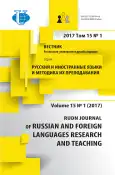ПРАГМАТИЧЕСКИЕ МОДЕЛИ ДИСКУРСИВНОЙ АНАФОРЫ В МОНОЛОГИЧЕСКОМ ТЕКСТЕ
- Авторы: Скнар Г.Д.1, Кудряшов И.А.2
-
Учреждения:
- Ростовский государственный медицинский университет
- Южный федеральный университет
- Выпуск: Том 15, № 1 (2017)
- Страницы: 51-65
- Раздел: Статьи
- URL: https://journal-vniispk.ru/2618-8163/article/view/345836
- DOI: https://doi.org/10.22363/2313-2264-2017-15-1-51-65
- ID: 345836
Цитировать
Полный текст
Аннотация
Цель статьи - определить прагматическую специфику тематической организации монологического текста с опорой на модели дискурсивной анафоры. Указанная цель предопределила решение задач, связанных с изложением концепции темы как текстового сегмента, проявляющего устойчивую зависимость от дискурсивной схемы художественного монологического текста; рассмотрением монологической сферы художественного текста с опорой на то, какую роль играют в ней тематические компоненты; выявлением того, какие последовательности анафорических (зависимых в референциальном отношении) языковых выражений формируют тематические компоненты в рамках дискурсивных схем монологического текста с учетом коммуникативной специфики этого текста. Выводы, полученные в работе, позволяют приблизиться к более полному пониманию того, как отношения когезии и анафорические отношения, моделируемые тематическими компонентами, облегчают интеграцию дискурсивных характеристик высказываний в более глобальную интерпретативную структуру. Доказывается, что оба феномена, образуя симбиоз, выполняют функцию поддержания континуальности значения и референтного плана связанных высказываний в рамках монологического текста. В этом видится теоретическая значимость проведенного исследования. Практическая значимость статьи определяется возможностью использования ее основных результатов для дальнейшей разработки проблемы «информационной упаковки» высказываний, принадлежащих к монологическим жанрам общения, для выявления закономерностей организации художественного текста как целого. Теоретические выводы, полученные в результате исследования, могут быть использованы в вузовском преподавании современного русского языка, стилистики декодирования, спецкурсах по филологической герменевтике, а также в спецкурсах по вопросам дискурсивных оснований организации монологического текста.
Об авторах
Галина Дмитриевна Скнар
Ростовский государственный медицинский университет
Автор, ответственный за переписку.
Email: vitsknar@aaanet.ru
доктор филологических наук, заведующая кафедрой русского языка и культуры русской речи Ростовского государственного медицинского университета
пер. Нахичеванский, 29, Ростов-на-Дону, Россия, 344022Игорь Александрович Кудряшов
Южный федеральный университет
Email: igalk@mail.ru
доктор филологических наук, профессор кафедры теории языка и русского языка Южного федерального университета
ул. Большая Садовая, 105/42, Ростов-на-Дону, Россия, 344006Список литературы
- Glagolev N.V. Vychlenenie semanticheskih jelementov kommunikativnoj strategii v tekste [Extracting semantic elements of the communicative strategy in the text]. Filologicheskie nauki. 1985. № 2. P. 55—62. (In Russ.)
- Dolinin K.A. Implicitnoe soderzhanie vyskazyvanija [The utterance implicit content]. Voprosy jazykoznanija. 1983. № 6. P. 37—43. (In Russ.)
- Cavins J. Text World Theory. An Introduction. Edinburgh: Edinburgh University Press, 2007. 193 p.
- Goncharova E.A. Antropocentrizm hronotopa kak konceptual’naja osnova hudozhestvennogo teksta [Hronothrope anthropocentrism as the fiction text conceptual basis]. Kategorizacija mira: prostranstvo i vremja: Materialy nauch. konf. M.: Dialog — MGU, 1997. P. 40—43. (In Russ.)
- Pushmina S.A. Tekstovoe mnogomirie i vhod v nego cherez vorota dejksisa [Textual multiworld and the entry in it through the deixis gate]: dis. … kand. filol. nauk. Tjumen’, 2009. (In Russ.)
- Cornish F. Anaphora, Discourse and Understanding. Evidence from English and French. Oxford: Clarendon Press, 1999. 297 p.
- Fateeva E.D. O nekotoryh problemah izuchenija diskursivnoj anafory: poiskah novyh podhodov [On some problems of discursive anaphora investigation: in the search of new approaches]. Jazyk i kommunikacija: izuchenie i obuchenie. Vyp. 11. Orel: OrGU, 2003. P. 18—27. (In Russ.)
- Petrusheskaja L. S. Sobranie sochinenij v 5 t. [Collective works in 5 vol.] Har’kov: Folio; M.: TKO AST, 1996. T. 1. 256 p. (In Russ.)
- Dik S.C. Anaphora. The Theory of Functional Grammar. Part 2: Complex and Derived Constructions. Berlin, NY.: Mouton de Gruyter, 1997. P. 215—228.
Дополнительные файлы









